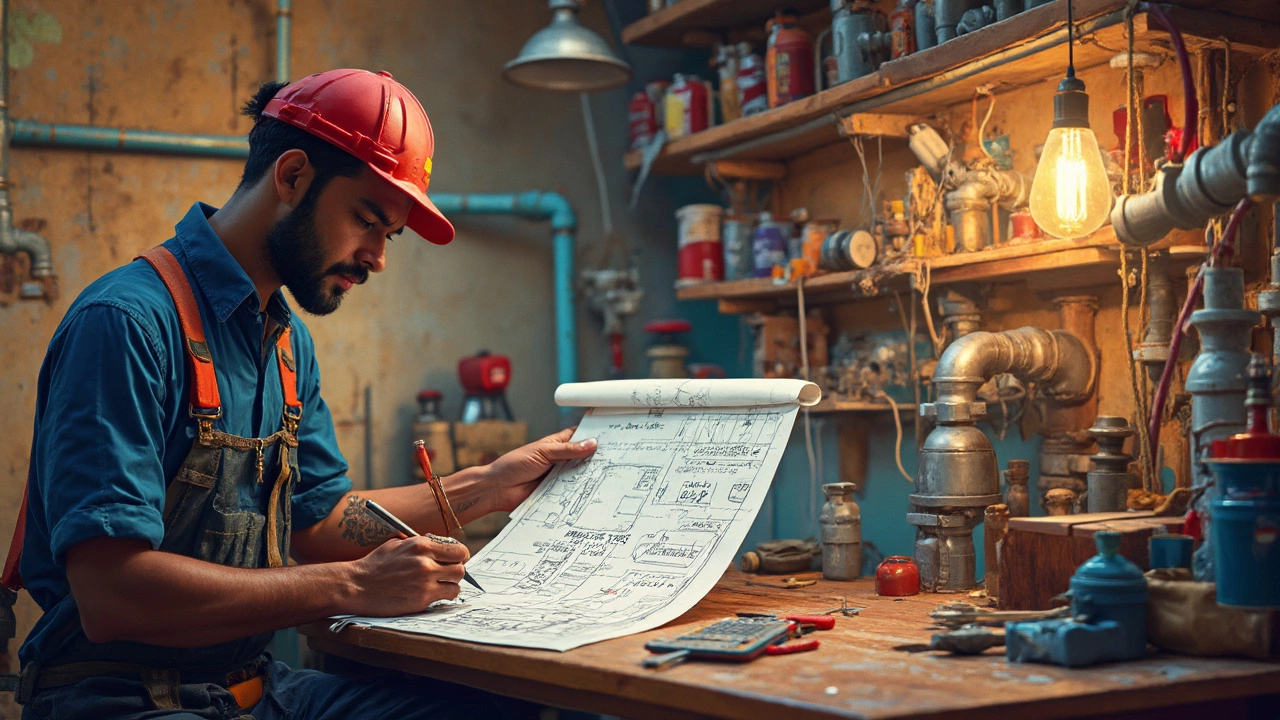Do You Need Math Skills to Be a Plumber?

So, you've got your sights set on becoming a plumber, but there's a pesky question nagging at you: Do I have to deal with math? Well, let's clear the air. While you won't need to solve complex equations, having a grip on some basic math can really make things easier. Plumbing isn't just about wrenches and pipes; it's about making precise installations and repairs.
Think about it. Ever tried to fit a square peg in a round hole? That's what plumbing can be like if the measurements are off. Whether it's calculating the right length of a pipe or figuring out the water pressure for a client's shower, a bit of math can save you headaches down the line.
Plumber training courses often include sections on practical math. These courses teach you how to measure accurately, calculate dimensions, and even convert between different units when needed. Isn't it reassuring to know that you won't be alone? Training helps take a lot of the guesswork out of the equation, so you're not left drowning in numbers.
- The Basic Math Behind Plumbing
- Practical Math Every Plumber Uses
- Training Courses and Math Skills
- Why Math Isn't a Deal-Breaker
The Basic Math Behind Plumbing
Alright, so here's where your high school math class swoops in to save the day. In plumbing, the math is all about keeping things functional and efficient. We're talking basic arithmetic, fractions, and a little bit of geometry—straightforward stuff that helps you keep things in line.
Imagine you're installing pipes for a new bathroom. You'll need to measure the space accurately to cut the pipes to the right length. No one wants a surprise gap in the pipework, right? This is where fractions and measuring skills come in, helping you get the dimensions just right.
Let's not forget about water pressure—crucial for making sure everything flows smoothly and doesn't burst. Calculating pressure requires understanding volume and height, plus how they relate, and yes, a bit of math magic.
Here's a cool aspect: think like a detective. Being a plumber often means solving a puzzle. Use logic and basic arithmetic to assess the situation. Are the pipes aligned? Is the water flow consistent? Your math skills help you adapt to new challenges and solve those head-scratchers quicker.
Sometimes you might even get into conversions, like metric to imperial, especially when dealing with international manufacturers. In those cases, quick math helps keep everything understandable and ensures you’re speaking the same language as your equipment.
If you're still itching to see numbers in action, check out a training course. These courses give you loads of tips on using math practically in plumbing. They blend classroom learning with hands-on practice, guiding you through everything without making it feel like a chore.
Math skills might not sound exciting, but honestly, they play a big part in making sure your plumbing works like a well-oiled machine. So, embrace those calculations—even if it's just to be sure the shower water doesn't hit you like a garden hose!
Practical Math Every Plumber Uses
Alright, let's dig into the nitty-gritty of how math finds its way into a plumber's daily life. It's not about proving trigonometric identities or tackling algebra problems. Instead, we're talking about the kind of practical math that's a plumber's best buddy on the job.
First up, there's measurement. Plumbers measure pipes, fittings, and distances with precision, because guessing just won't cut it. Imagine installing a pipe that's too short or too long; that's hassle you don't want. Precise measurements ensure everything fits snugly.
Then, there's reading blueprints. Those squiggly lines and numbers can look like a different language at first. But knowing how to read them is crucial for understanding how a plumbing system is meant to come together. Blueprints often include scales, so you'll need some basic math to convert real-world dimensions.
Let’s not forget about volume calculations. Sometimes, you'll need to determine the capacity of a tank or basin. Knowing how to quickly calculate volume can save you from overflows or inadequate supply.
Pressure is another area where math sneaks in. For instance, understanding water pressure helps decide which pipes to use and ensures that water flows effectively through the system. Too much pressure can burst pipes, while too little leaves customers complaining about weak showers.
- Calculate pipe length: Simple addition and subtraction help determine how many feet of pipe are needed.
- Convert units: Switching between inches and centimeters, or gallons and liters, keeps everything consistent.
- Use formulas for angles: Sometimes you'll need to cut pipes at specific angles; knowing how to calculate these is key.
Here's a handy fact: According to a 2024 industry survey, over 70% of plumbers reported needing math skills frequently in their work. So while it might not be rocket science, having your math game in shape definitely makes life easier.

Training Courses and Math Skills
Alright, let's talk about how plumber training courses can give you the math skills you might need on the job. Think of these courses as your toolbox to tackle plumbing challenges. They're specifically designed to make sure you’re more than just a wrench wizard. And don't worry—they won't throw you into advanced calculus or anything.
Most training programs start with the basics, like basic arithmetic, making sure you can add, subtract, multiply, and divide. You’ll dive into measurements, which are essential for ensuring those pipe lengths fit just right. Hey, no one wants a bathroom flood because the pipes were cut too short!
Additionally, courses teach you how to interpret blueprints and diagrams, which require understanding dimensions and scales. If you've ever put together Ikea furniture, you know how important it is to read instructions correctly to avoid a lopsided bookshelf.
Let’s put some numbers to it. In some regions, about 75% of plumbing contracts demand precise measurement skills. Thankfully, courses use practical exercises, so when you’re out in the field, whipping out those conversion tables or calculating water pressure isn’t a head-scratcher.
Here's a bit of what you'd typically cover:
- Measurement tools—like calipers and levels.
- Converting units (because sometimes you’ll mix metric and imperial).
- Estimating materials—a skill that’s crucial when quoting job costs to clients.
Still feeling a bit anxious about numbers? It’s totally normal! But these plumbing courses break it down in a way that’s all about the practical side. You’re not just memorizing—it’s about understanding how math fits into real-life plumbing scenarios, ensuring that you can confidently tackle any project that comes your way.
Why Math Isn't a Deal-Breaker
If math isn't your strong suit, don't worry too much – it's not a deal-breaker when it comes to becoming a plumber. While having some basic math skills is definitely handy, it's not like you need to be a math genius to connect pipes or fix leaks. Most of the calculations you'll be doing are straightforward, and there's plenty of help available to make sure you get them right.
Plumbing often involves practical math, the stuff that comes in handy daily like measuring pipe lengths or calculating surface areas for installations. Think about things like figuring out how much piping you'll need for a job or ensuring the water pressure is just right. These tasks require math, but it's the kind you can easily master with practice and a bit of training.
The good news is plumber training courses are pretty great at teaching the math you need without getting overly complicated. You'll learn all the tricks of the trade to make those calculations a breeze. Plus, in today’s tech world, there are tools and apps out there designed to help with measurements and conversions, taking a lot of the pressure off your brain.
As a quick tip: always double-check your work. A small error in math can lead to bigger fixes later, which nobody wants. But with practice, you'll find that these tasks get easier over time. My buddy Tom, a seasoned plumber, swore he hated math in school, but after a few years on the job, he said it became second nature.
For those who think they might struggle, here's a little table of activities and the types of math skills typically involved:
| Activity | Math Skill |
|---|---|
| Cutting pipe to fit | Basic measurement and arithmetic |
| Estimating materials needed | Basic estimation and multiplication |
| Calculating water flow | Understanding volume and pressure |
In short, math is part of the job, but it doesn't have to scare you off. With some training and practice, you'll be doing math like a pro, and who knows? You might even start liking it.

Post-Comment